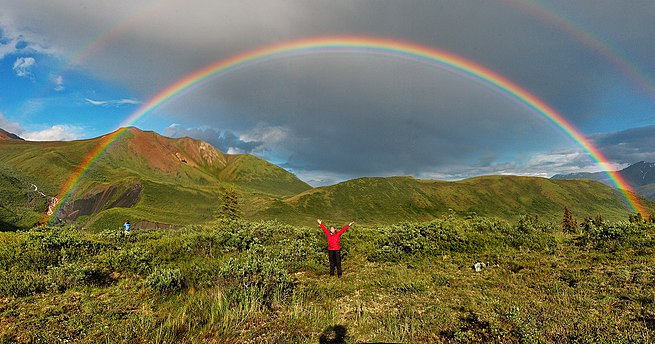
Main Difference
The main difference between Rainbow and Spectrum is that the Rainbow is a meteorological phenomenon caused by reflection, refraction and dispersion of light in water droplets and Spectrum is a continuous range of values, such as wavelengths in physics
-
Rainbow
A rainbow is a meteorological phenomenon that is caused by reflection, refraction and dispersion of light in water droplets resulting in a spectrum of light appearing in the sky. It takes the form of a multicoloured circular arc. Rainbows caused by sunlight always appear in the section of sky directly opposite the sun.
Rainbows can be full circles. However, the observer normally sees only an arc formed by illuminated droplets above the ground, and centered on a line from the sun to the observer’s eye.
In a primary rainbow, the arc shows red on the outer part and violet on the inner side. This rainbow is caused by light being refracted when entering a droplet of water, then reflected inside on the back of the droplet and refracted again when leaving it.
In a double rainbow, a second arc is seen outside the primary arc, and has the order of its colours reversed, with red on the inner side of the arc. This is caused by the light being reflected twice on the inside of the droplet before leaving it.
-
Spectrum
A spectrum (plural spectra or spectrums) is a condition that is not limited to a specific set of values but can vary, without steps, across a continuum. The word was first used scientifically in optics to describe the rainbow of colors in visible light after passing through a prism. As scientific understanding of light advanced, it came to apply to the entire electromagnetic spectrum. It thereby became a mapping of a range of magnitudes (wavelengths) to a range of qualities, which are the perceived “colors of the rainbow” and other properties which correspond to wavelengths that lie outside of the visible light spectrum.
Spectrum has since been applied by analogy to topics outside optics. Thus, one might talk about the “spectrum of political opinion”, or the “spectrum of activity” of a drug, or the “autism spectrum”. In these uses, values within a spectrum may not be associated with precisely quantifiable numbers or definitions. Such uses imply a broad range of conditions or behaviors grouped together and studied under a single title for ease of discussion. Nonscientific uses of the term spectrum are sometimes misleading. For instance, a single left–right spectrum of political opinion does not capture the full range of people’s political beliefs. Political scientists use a variety of biaxial and multiaxial systems to more accurately characterize political opinion.
In most modern usages of spectrum there is a unifying theme between the extremes at either end. This was not always true in older usage.
-
Rainbow (noun)
A multicoloured arch in the sky, produced by prismatic refraction of light within droplets of rain in the air.
-
Rainbow (noun)
Any prismatic refraction of light showing a spectrum of colours.
-
Rainbow (noun)
A wide assortment; a varied multitude.
“a rainbow of possibilities”
-
Rainbow (noun)
An illusion, mirage.
“Many electoral promises are rainbows, vanishing soon after poll day.”
-
Rainbow (noun)
A curveball, particularly a slow one.
-
Rainbow (noun)
In Texas hold ’em or Omaha hold ’em, a flop that contains three different suits.
-
Rainbow (noun)
Rainbow trout.
-
Rainbow (adjective)
Multicolored.
-
Rainbow (adjective)
Made up of several races or ethnicities, or (more broadly) of several cultural or ideological factions.
-
Rainbow (adjective)
LGBT.
-
Rainbow (adjective)
Composed entirely of different suits.
-
Rainbow (verb)
To rainbow; to pattern with the colours of the rainbow.
-
Rainbow (verb)
To take the rainbow.
-
Spectrum (noun)
A range; a continuous, infinite, one-dimensional set, possibly bounded by extremes.
-
Spectrum (noun)
Specifically, a range of frequencies; hence electromagnetic spectrum, visible spectrum, ultraviolet spectrum, etc. from later 17th c.
-
Spectrum (noun)
The autism spectrum.
-
Spectrum (noun)
The pattern of absorption or emission of radiation produced by a substance when subjected to energy (radiation, heat, electricity, etc.).
-
Spectrum (noun)
The set of eigenvalues of a matrix.
-
Spectrum (noun)
Of a bounded linear operator A, the set of scalar values λ such that the operator A—λI, where I denotes the identity operator, does not have a bounded inverse; intended as a generalisation of the linear algebra sense.
-
Spectrum (noun)
The set, denoted Spec(R), of all prime ideals of a given ring R, commonly augmented with a Zariski topology and considered as a topological space.
“Stone space”
-
Spectrum (noun)
Specter, apparition. from early 17th c.
-
Spectrum (noun)
The image of something seen that persists after the eyes are closed.
